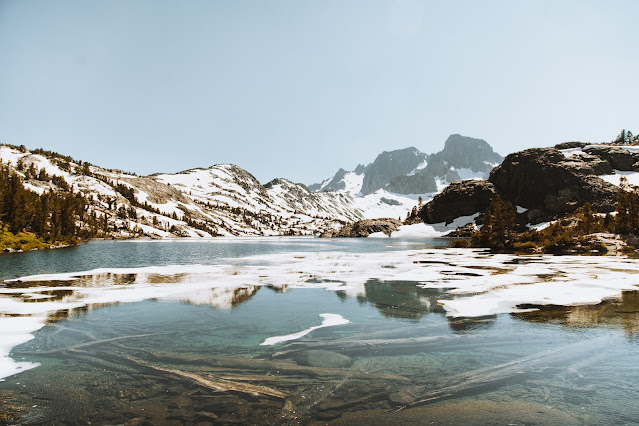Lighten Your Load
As my wife has written many times, minimalism isn't about having zero possessions or living a Spartan existence in a spare room or a remote cave. As minimalists we value and use the essentials, realizing that we need some material things to facilitate our lives. Ah, but "essentials" can be a tricky word. What one considers essential, another may consider extravagant. Hmmm... perhaps insight may be gained by comparing minimalist thinking with prepping for a wilderness backpacking trip!
Why backpacking? For many, it is the ultimate getaway. You make your way on foot from point A to points B, C, and D while carrying all your essentials in a pack on your back. No phones, no emails, no distractions. Just yourself, your companions, the challenges of the trail, and the glories of the natural world.
Needs vs. wants
To start with, basically, all we need is food, water, and shelter. Fortunately the load we carry can be minimized by the careful choices we make. These can range from extremely simple to unnecessarily cluttered (and heavy).
On his first backpacking trip, my high school friend Randy carried his own four-man tent, air mattress, and large AM/FM cassette radio (it was the mid '70s), in addition to his clothes, food, stove, and fishing gear. We teased and joked as he heaved his load up the trail, but he had the last laugh. Shortly after setting up camp later that day, Randy sprained his ankle slipping on a snow patch... and we had to lug his stuff out for him the next day while he rode a mule... no joking matter this time.
On the opposite end of this choosing-what-to-bring spectrum is what naturalist and conservationist John Muir famously carried on his High Sierra excursions. Often Muir would simply roll up some bread, tea, sugar, and a tin cup in a pair of blankets and set off roaming the high country for days.
Obviously, as you plan your trip, what you choose to take will land somewhere between these two extremes. My advice? When backpacking, keep it simple and keep it light. If your pack is so cumbersome and heavy that it wears you out and distracts you from enjoying the natural beauty around you, what's the point? You're carrying too much stuff.
In the same way, before you start your minimalist journey, set priorities. Think about must-haves versus nice-to-haves. If our lives are over-extended, over-scheduled, and over-cluttered, our attention will be on the pain and soreness of these burdens, and we'll miss out on the beauties of everyday life.
Of course, choosing what is absolutely necessary for a multi-day-and-night hike into the back country requires careful planning, and there are plenty of resources out there to help you prepare for your wilderness adventure. You'll need to consider where and when you are hiking, if the weather will be wet or not, and the personal preferences of your group.
As with minimalism, you'll want to carry everything you need, but nothing more. If you add too much to your pack, each overloaded step will get heavier and more uncomfortable. What started as a blissful sojourn into paradise will rapidly devolve into a staggering struggle to get your gear around the next bend in the trail!
Your most important assets aren't things.
Growing up backpacking with my father and three brothers, the fun challenge was making our packs as lightweight as possible. Dad, of course, carried the heaviest pack, older brother the next heaviest, and so on down the line. Hiking with several people in our group allowed us to work together, and spreading the weight around made everyone's burden lighter. As you hike your minimalist path, find others in your life – family, friends, loved ones – to support you and share your adventure.
Finally, don't forget that your most important assets in backpacking are your mind and your heart. You can have the best gear and be in the best physical shape, but those things will not help you deal with the pesky bear that wants your food the first night, the huge snow patch near the pass that is normally melted by now, or the sudden afternoon thunderstorm that traps you above the tree line. In the same way, more possessions, a bigger income, and Ironman fitness cannot replace your knowledge and preparation, your anticipation of challenges you may face, and your resourcefulness in dealing with them, the attention and awareness you give to your surroundings, and your calm and positive attitude.
Backpacking can be freeing, fun, and rewarding. Simplifying our lives can be too!
Related article: How to Think Like a Minimalist






Comments
Post a Comment